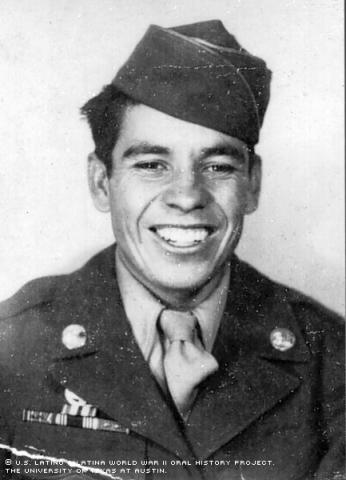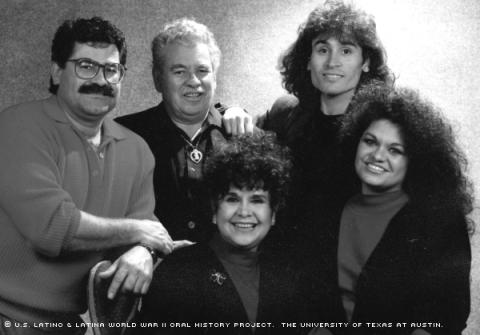

By Celina Moreno
Tomás Martinez, a veteran of the Normandy Invasion and the Battle of the Bulge who became a barber, has lived by a "do-it-yourself" philosophy since his youth in southern New Mexico.
Born Dec. 21, 1923, to Amador Martinez and Manuela Mendoza Martinez, Martinez was the fourth of 12 children who grew up in the New Mexican farm village of Vado, where the Mendoza side of the family had lived since the 1590s, before the United States annexed what is now the Southwestern United States.
Martinez has strong opinions on how the conquest of that region has affected the modern-day treatment of Mexican Americans. He believes the U.S. government has "tried to keep us down" so Mexican Americans don’t attempt to reclaim those states.
"My people have been in the same place since the 1500s," he said. "And my [war experience] has made me think that I have more of a right to be in the United States than most anybody else."
After World War II began, Martinez expected to receive a draft notice and join his brother and a few other enlisted relatives.
"I was a little ol' country boy out there. I thought that I was going to get on the boat from the United States and go right into battle,'' he said "But of course, it wasn't like that."
Inducted into the Army in Las Cruces, N.M., in 1942, Martinez, then 18, was sent to Fort Bliss, Texas, in El Paso. He then attended 17 weeks of medical training at Camp Barkeley in Abilene, Texas, and was later shipped to Pennsylvania, New York, Scotland and England until he finally arrived in France during the Normandy Invasion, as part of the 261st Medical Battalion, 1st Engineer Brigade.
"When you were in the service, you didn't know where you were going or where you had been," Martinez said. "You were like a horse with its eyes shut -- you only go wherever they take you."
Three hours after arriving in Normandy on June 6, 1944, Martinez was wounded when his landing craft hit a water mine and was blown in half; he was sent to a hospital in England for two and a half months. When fit to return to battle, the Army assigned him to the 2nd Batallion, 319 Regiment of the 80th Division, 3rd Division.
A medic himself, Martinez -- nicknamed Marti by his unit -- was often in the line of fire and, on occasion, disobeyed officers' orders to help the wounded.
"If you're in combat ... you weren't afraid of anything," he said. "As long as you know what to do, orders don't really mean very much to you."
Medics weren’t officially allowed to work as night patrollers, but he’d sometimes volunteer for the duty because he didn't want his Anglo counterparts to say, "This little ol' Mexican is a chicken."
Once on night patrol, Martinez heard German soldiers approaching as he hid in a foxhole.
"I'd start getting sick in my stomach and would want to go to the toilet," Martinez said. "You'd wish the dirt would eat you up."
The Germans wounded Martinez for the second time -- this injury was to the knee.
"Pain is to be in combat where there are bullets flying and you can almost feel the heat of them," he thought. "That's pain that you don't know what's going to make it go away unless you get killed."
To Martinez and his unit, that pain was unofficially over the day they defeated the Germans at the Battle of the Bulge, where he was again wounded, this time in the arm.
"The infantry was withdrawing, when I and the crew of medics went to pick up the wounded left behind," he said. " ... A piece of shrapnel hit me inside the arm near the elbow, sending me to the hospital for three weeks."
Martinez was discharged on Sept. 28, 1945; he would eventually receive one Silver Star medal, three Purple Heart medals and several other honors. In Vado, the highly acclaimed Silver Star established him as a hero, and villagers came to meet him when he arrived at the local bus station.
"I hate to say this because it sounds like I'm bragging," he said. "I was not one of them, but I was the hero of the village."
After traveling around the world, however, Martinez stayed only a few weeks in a place he’d lived his whole life: Vado seemed to have nothing to offer.
Too proud to cash in on the GI Bill, which would have paid for a college education, Martinez moved to Los Angeles and then to Northern California, where he picked grapes and eventually met his wife, Celia Salcido, with whom he had three children: Tommy, Chris and Vivian.
Martinez said he paid for barber school out of his own pocket. Later, he would regret not using the GI Bill educational benefits.
The only aid Martinez said he received was from the government when he joined the pre-war Civilian Conservation Corps, or CCC, from July of 1940 through June of 1941.
"If somebody gives me $1 million, what do I want a $1 million for?" he said. "I want what I can make out of my hands -- that's what I'm real proud of. If someone has $1 million that their dad gave them and I've got only $1,000 that I made myself, that man ain't got nothing on me."
Martinez, who was a barber for 22 years, built his home with his hands.
Now 77, he hangs outside the house a sign reading: “Fin de la Jornada,” or, The End of the Journey.
Because of determination and hard work, Martinez's journey seems all but complete.
Mr. Martinez was interviewed in Penn Valley, California, on April 1, 2001, by Marcello Salcido.

